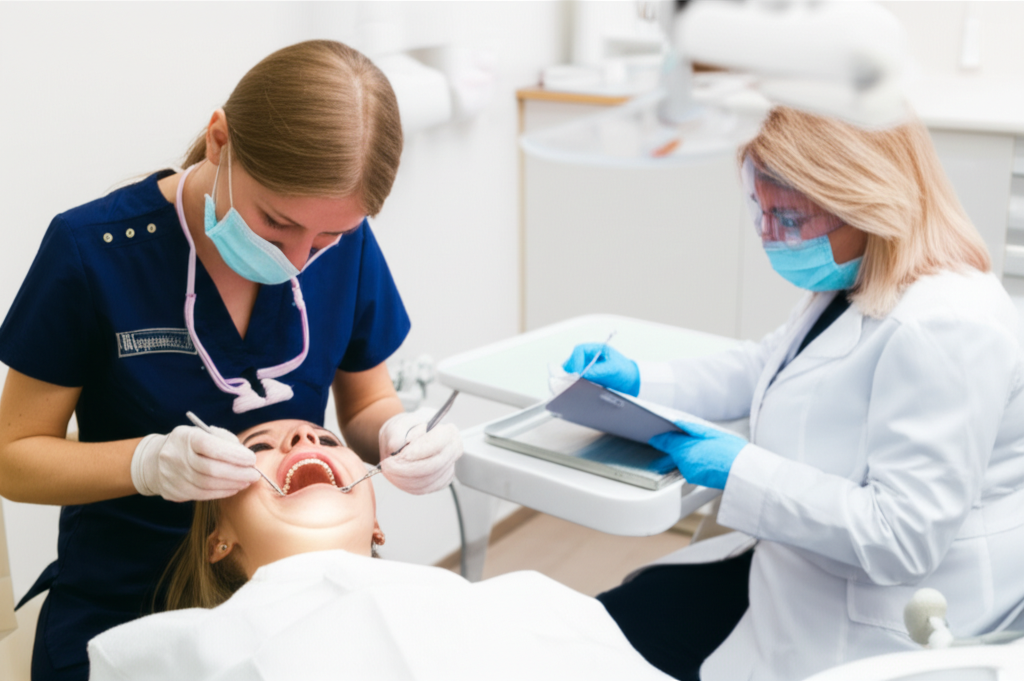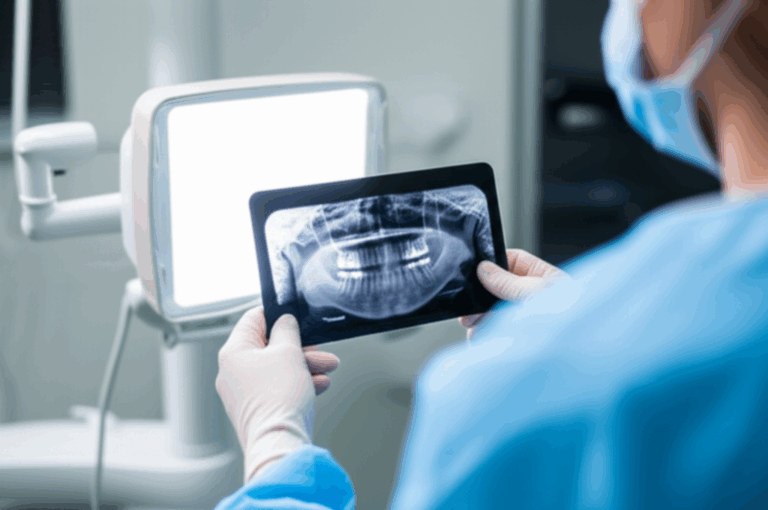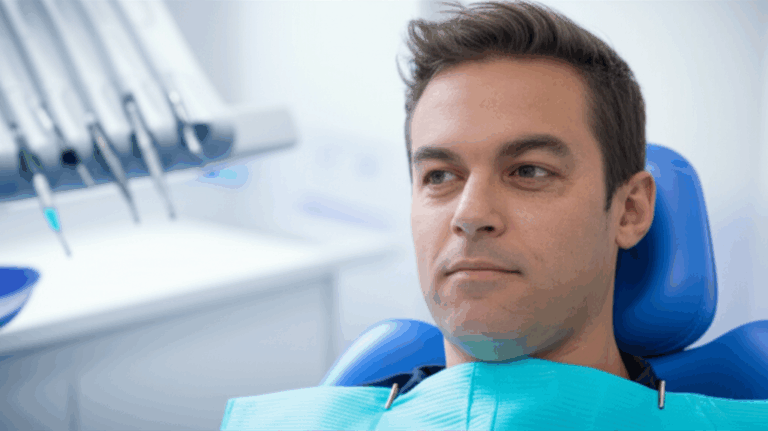
Are Dental Hygienists Dentists? Unpacking the Main Differences Between Dental Roles
You walk into a dental office and two people greet you. One cleans your teeth and reminds you to floss. The other looks at X-rays and tells you if you need a filling. They feel like a team. So you wonder, are dental hygienists dentists?
Short answer: No, dental hygienists are not dentists. They are licensed oral health workers who focus on checking for problems, teaching you about care, and doing certain treatments. Dentists are doctors who find tooth diseases, create treatment plans, and do repair and surgery in your mouth.
The confusion makes sense. Both wear scrubs. Both work in your mouth. Both want you to keep your teeth healthy. Knowing who does what helps you ask better questions, set your expectations, and get the right care at the right time. If you are thinking about a dental career, it helps you plan your journey too.
Table of Contents
Diagnosis vs. Prevention: The Big Split
Dentists (DDS/DMD)
Main job: Dentists figure out what’s wrong in your mouth, fix problems, and keep an eye on your overall oral health. They check your teeth, gums, and jaw. They do fillings and crowns. They do surgery too, like pulling teeth or root canals. They can give you medicine if needed. They make plans for your whole mouth and lead the dental office team.
Training: Dentists finish a dental school program (Doctor of Dental Surgery – DDS, or Doctor of Dental Medicine – DMD). Both degrees are the same. Dentists need to pass national and state exams before working.
Dental hygienists (RDH)
Main job: Dental hygienists focus on stopping gum disease and cavities before they start. They clean teeth and remove hard buildup. They do deep cleanings if you have gum problems. They take X-rays and look at them before the dentist checks. They put on fluoride and dental sealants. They teach you how to brush and floss right, and talk about food that helps your teeth. In many states, they can numb your gums with medicine to make you comfortable.
Training: Hygienists complete a dental hygiene program and pass exams. They are trained to teach, find problems early, and help you keep your mouth clean.
Two different jobs. One great smile. Dentists find and fix problems. Hygienists help prevent problems and keep your teeth healthy.
What Each Professional Does
Dentists
Check and diagnose
Dentists do full dental exams. They review your health and medicine, check for cavities, gum disease, mouth sores, jaw issues, and oral cancer. They read X-rays and decide what’s wrong and what needs fixing.
Treatment plans and choices
Dentists make a personal plan for you. They explain options (fillings, crowns, bridges, root canals, gum treatment, implants, braces) and talk about costs and risks. You decide what’s next together.
Fixing and surgery
Dentists fill cavities, put on crowns, bridges, do root canals, and pull teeth. Some also offer braces. Many send you to a specialist for hard cases (like kids, gum, or jaw surgery).
Prescriptions
Dentists can write prescriptions for medicine like antibiotics and pain relief after dental work.
Leads the team
Dentists are the boss in the treatment room. They run the office, make sure everyone works safely, and care for patients.
Dental hygienists
Cleanings and gum care
Hygienists remove plaque and tartar. They do deep cleanings if you have gum disease. They check your gums and compare with past visits.
X-rays and checks
Hygienists take dental X-rays and photos. They look for mouth troubles and tell the dentist what they see.
Protection treatments
Hygienists put on fluoride and sealants to protect teeth from cavities. Many can numb your mouth with local anesthesia for some cleanings.
Teach and coach
Hygienists help you with brushing and flossing, food choices, and habits like grinding your teeth. Their advice fits your age or situation.
Paperwork and teamwork
Hygienists record gum charts, check risks, help with recall schedules, and make sure the dentist knows what’s happening with your mouth.
If you ask who cleans your teeth, it’s almost always the hygienist. If you need a root canal or crown, that’s your dentist or a dental specialist.
Training and License: The Details
To Be a Dentist
How long does it take?
Four years of college (usually), then four years of dental school for a DDS or DMD.
School requirements
Schools are checked by CODA. Classes cover everything from body science, tooth anatomy, filling teeth, gum work, tooth nerves, making fake teeth, mouth diseases, braces, numbing, X-rays, and running a safe, honest clinic.
Exams
Dentists must pass the National Board Dental Exam and state tests. Some dentists then spend extra years to train as a specialist.
Keep learning
Dentists do classes every year to keep their license.
To Be a Dental Hygienist
How long does it take?
The associate’s degree takes 2–3 years. Some study for a bachelor’s (4 years) to work in teaching or public health.
School requirements
Schools are checked by CODA. Classes include body science, gums, X-rays, medicine, numbing, teaching, and lots of real-life practice.
Exams
Hygienists pass the National Dental Hygiene Exam and state tests. They are called Registered Dental Hygienists (RDH).
Keep learning
Hygienists take classes to renew their license. The ADHA supports their learning.
Dental hygienists don’t go to dental school. Dentists don’t do full hygiene training. Each one learns what their job needs.
Scope of Practice: What Is Allowed
Dentist
- Dentists can spot and diagnose all oral diseases, make plans, and give opinions.
- Dentists do any invasive work (drill, fill, crowns, root canals, pull teeth, surgery, etc).
- Dentists can prescribe medicines and handle problems after treatment.
- Dentists can run a practice, supervise staff, and direct all patient care.
Dental Hygienist
- Hygienists clean teeth, do deep cleaning, apply fluoride, sealants, and screen for mouth cancer.
- Many can numb you with local anesthesia. Some can place temporary fillings (depends on state rules).
- Hygienists CANNOT diagnose diseases. They point out things for the dentist to check.
- Hygienists generally can’t prescribe medicine.
- Independent or direct work by hygienists varies a lot. Some states let hygienists open their own office for cleanings, most need a dentist’s oversight.
State rules matter. What a hygienist can do in one state may not be the same somewhere else. Ask your office what’s allowed where you live.
Working as a Team
A dental office is like a band—everyone has their job so the music sounds good:
- The dentist is the main decision-maker and does the main repairs and surgery.
- The hygienist focuses on cleaning and stopping problems before they start.
- The assistant helps with equipment, cleaning, and keeping you comfortable.
- The dental lab makes crowns, bridges, dentures, and anything custom for your teeth.
When your dentist plans a crown or bridge, the work often goes to a crown and bridge lab that makes the piece to fit your smile just right. When you get an implant, the office may work with an implant dental laboratory to design the tooth that matches your jaw and gums. For cosmetic fixes, your dentist might use a veneer lab for lifelike color and look.
If the staff talks well together, your care feels smooth and you get the right person for each job.
What Should Patients Do?
At Home:
- Brush your teeth twice a day with fluoride toothpaste. Floss or clean between teeth once a day.
- Use a soft toothbrush. If hand strength is an issue, use a power brush. Fluoride makes teeth stronger.
- Avoid lots of sweets and sugary drinks. Drink water after coffee or soda. Chew sugar-free gum to help saliva protect your teeth.
- Watch for signs like bleeding gums, bad breath, sore teeth, or chips. If something changes, get help sooner.
See Your Hygienist:
- Get regular cleanings (usually every 3–6 months), gum checks, mouth cancer check, and tips on brushing and eating for healthy teeth.
- If you have gum disease, get scaling and root planing. The hygienist may numb your mouth for deep cleaning.
- For advice on cleaning around braces, crowns, or dentures.
See Your Dentist:
- If you have tooth pain, swelling, a cracked tooth, or lasting sensitivity.
- If you need treatment—fillings, crowns, bridges, root canals, extractions, or braces.
- For a diagnosis of problems the hygienist noticed.
- If you need medicine or a specialist.
Who Does What: Common Procedures
| Procedure | Who Does It |
|---|---|
| Regular cleaning, gum care | Dental hygienist |
| Scaling and root planing (deep clean) | Dental hygienist |
| X-rays, first review | Hygienist takes, dentist reads |
| Fluoride and sealants | Dental hygienist |
| Full exams, diagnosis | Dentist |
| Fillings, crown, bridge, veneers | Dentist (sometimes specialist) |
| Root canal | Dentist or endodontist |
| Tooth extractions, surgery | Dentist or oral surgeon |
| Braces | Orthodontist or dentist with training |
| Dentures, implants | Prosthodontist/General dentist |
| Biopsy/oral cancer diagnosis | Dentist or specialist |
Careers Side by Side
Education
- Dentist: DDS or DMD degree after 8 years of school (or more if you specialize)
- Hygienist: Associate or bachelor’s degree in dental hygiene (2–4 years)
Licenses
- Dentist: Passes the main dental boards and clinical exams
- Hygienist: Passes the hygiene board and clinical exams
Cost and Time
- Dentist: More years and more cost, but higher earnings.
- Hygienist: Less time, quicker to work.
Pay and Future
- Dental Hygienist: Median pay ~$87,490 a year (2022)
- Dentist: Median pay ~$178,260 a year (2022)
- Job growth steady for both, with more need as people focus on keeping teeth and mouths healthy.
Is It a Good Career?
- Dentists: Great for those who like detailed work, leading a team, and fixing problems.
- Hygienists: Good if you like teaching, prevention, hands-on work, and flexible hours.
Dental Office Jobs and Titles
- DDS/DMD: Dentist degrees; the same thing but different names.
- RDH: Registered Dental Hygienist, with a state license.
- Dental Assistant: Helps dentist and hygienist, manages instruments, helps during treatments. In some states, can help with temporary fillings or sealants.
- General Dentist/Specialists: Generalists see all ages; specialists focus on one area (root canals, gums, kids, surgery).
- Office Owner: Dentist who runs the business and handles money, rules, and staff.
What Hygienists Can’t Do (and More Fast Answers)
- Are hygienists dentists? No. They are trained and licensed for different jobs.
- Can hygienists diagnose problems? They can spot and mention issues, but only dentists can give an official diagnosis or create treatment plans.
- Can hygienists fill cavities? Not permanent ones. In some states, hygienists place temporary fillings with dentist supervision.
- Can hygienists pull teeth? No. Only dentists (or sometimes surgeons) can remove teeth.
- Can hygienists run their own business? In some states, yes, but only for cleanings and prevention—not for fixing teeth. Rules change by state.
- Who does root canals? Dentists or root canal specialists.
- Can hygienists give shots to numb you? Most can after training, depending on state law.
- Who reads X-rays? Hygienists often take X-rays, but dentists give the final reading.
The Lab’s Role: Crowns, Bridges, Implants, Veneers
When you need a crown or bridge, your dentist works with a lab to make a new tooth that fits. Implants need special planning, so your dentist teams up with a lab expert to make a tooth that fits your mouth. Cosmetic fixes—like new front teeth—need a lab with good color-matching skills. Many clinics also use digital dental labs to speed up the process with 3D scans and printing.
Labs help dentists give you better results, but your dentist is always in charge of your plan and treatment. Your hygienist helps you keep it clean and working for as long as possible.
Staying Safe and Honest
- Ethics: Dentists and hygienists should explain your choices, respect what you want, and always be honest.
- Infection and X-ray safety: Dental offices follow strict cleaning rules. X-rays use very low radiation.
- Ongoing learning: Both jobs require more schooling every year to keep up with new treatments and info.
Public Health and Community Care
Not all dental care is in private offices. Some dentists and hygienists work in schools, clinics, and nursing homes. Some states let hygienists clean and screen kids’ teeth in schools without a dentist there that day, then dentists check the results and handle treatment if needed.
Which Provider for What Problem?
- Preventive care: See your hygienist. They will clean, do sealants, fluoride, and teach you better habits.
- Pain, broken tooth, or decay: See your dentist for exams and fixing the problem.
- Kids’ care: Many general dentists and specialists take care of children.
- Complex repairs: Dentists or dental specialists plan these; hygienists help you take care of them.
Quick Cheatsheet
- Dental hygienist: Cleans, prevents, checks, teaches. Registered as RDH. Works as part of a team.
- Dentist: Examines, diagnoses, treats, repairs, leads the office. Licensed as DDS or DMD.
Which Career is for You?
- Dental hygiene career: If you like helping people one-on-one, teaching, and a job with flexible hours. Quick start with good pay.
- Dentist career: If you like solving hard problems, being a leader, and don’t mind lots of school. More pay and options.
The Future: Tech in Dentistry
Digital tools are changing dentistry. 3D scanners mean no more messy impressions. Computer design (CAD/CAM) for crowns fits better and is faster. 3D printing makes mouth guards and models in less time. Hygienists and dentists both use digital records to track your care.
Frequently Asked Questions
- Is a dental hygienist a doctor? No. Dentists have doctorate degrees, hygienists have associate’s or bachelor’s.
- Who writes prescriptions? Only dentists.
- What is DDS vs RDH? DDS = dentist. RDH = dental hygienist.
- Can a dentist be a hygienist? Dentists can do preventive work but are usually busy with exams and repairs. Hygienists can’t be dentists without going back to school.
- Do dental hygienists go to dental school? No, they go to hygiene school.
- Who does braces? Orthodontists (specialists) or some general dentists.
- Who puts in implants? Dentists, gum specialists, or oral surgeons.
- Who makes dentures? Prosthodontists, some general dentists, and then the lab. Hygienists teach you how to clean them.
- What does a maxillofacial surgeon do? Does tough extractions, jaw surgery, or fixes big injuries.
References You Can Trust
- Education and license rules come from CODA and state boards.
- Job ethics and roles are set by the American Dental Association (ADA) and American Dental Hygienists’ Association (ADHA).
- Pay and job outlook: U.S. Bureau of Labor Statistics (BLS).
Key Takeaways: Remember This!
- Dental hygienists and dentists have different training and licenses. They work together but have different jobs.
- Dentists diagnose, treat, and fix problems. Hygienists clean and help prevent problems.
- What hygienists can do depends on your state. Most can numb your mouth; some can put in temporary fillings. Only dentists can diagnose and do drilling, extractions, or root canals.
- See your hygienist for cleanings. See your dentist for problems or repairs.
- Ask questions! Good communication with your dentist and hygienist means better care and a healthier smile.
Next Steps
- Book your next cleaning and checkup, especially if it’s been more than 6 months.
- Make a list of questions to ask at your next visit.
- Ask your hygienist for tips and the best tools for cleaning at home.
- Ask your dentist to explain any treatment plans you get.
- Keep copies of your records and X-rays for easy move or second opinion.
Learn More:
- Crown and Bridge Lab: how your new tooth is made
- Implant Dental Laboratory: how implants fit right
- Veneer Lab: how cosmetic veneers are crafted
- Digital Dental Lab: how 3D scanning changes dentistry
Fast Glossary
- Dental hygienist: Cleans teeth, gives gum care, takes X-rays, puts on fluoride, sealants, teaches you about oral care.
- Dentist: The doctor who finds, treats, and fixes mouth problems.
- DDS/DMD: Dentist degrees.
- RDH: Registered Dental Hygienist.
- Prevention: Stopping cavities/gum problems before they happen.
- Restorative: Fixing what’s already broken or diseased.
- Periodontal disease: Gum disease; can cause bone and tooth loss. Treated by deep cleaning.
- Local anesthesia: Shots to numb your mouth.
- Oral cancer screening: Checking for signs of mouth cancer.
- Licensing: Getting approval from state boards to work.
- Accreditation: Making sure schools and training programs meet set rules and standards.
Final Thought
You don’t need to remember every job title. Just remember: your hygienist helps keep your teeth healthy with cleanings and tips. Your dentist fixes problems and does exams. Together, they help your smile last a lifetime. Ask questions at your visits, and keep up your daily routine—it makes a real difference







